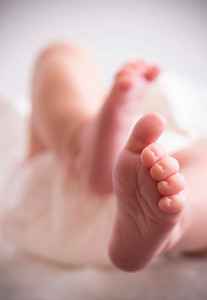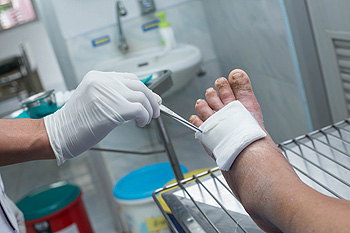
Drexel Hill (484) 521-0233
West Chester (610) 436-5883

Drexel Hill (484) 521-0233
West Chester (610) 436-5883
General foot pain is a common ailment many pregnant women experience. The arches of the foot may disappear as the weight of the body increases, and this can produce a considerable amount of discomfort. The ankles will often become swollen during the latter half of pregnancy, and this may be a result of increased blood pressure. Relief can be found while frequent rests are taken, and it is also beneficial to elevate the feet. Many pregnant women notice ingrown toenails, and this can be due to any changes that may occur in the shape and size of the nail. Research has shown that it is helpful to frequently perform gentle exercises, in addition to drinking plenty of water daily. If you would like additional information on how pregnancy affects the feet, it is recommended that you speak with a podiatrist.
Pregnant women with swollen feet can be treated with a variety of different methods that are readily available. For more information about other cures for swollen feet during pregnancy, consult with the podiatrists from Dr. Siegerman & Associates. Our doctors will attend to all of your foot and ankle needs.
What Foot Problems Can Arise During Pregnancy?
One problem that can occur is overpronation, which occurs when the arch of the foot flattens and tends to roll inward. This can cause pain and discomfort in your heels while you’re walking or even just standing up, trying to support your baby.
Another problem is edema, or swelling in the extremities. This often affects the feet during pregnancy but tends to occur in the later stages.
How Can I Keep My Feet Healthy During Pregnancy?
If you have any questions please feel free to contact one of our offices located in Drexel Hill and West Chester, PA . We offer the newest diagnostic and treatment technologies for all your foot and ankle needs.
 When babies are born, the foot bones have not fully developed, and the feet are generally flexible. It is beneficial for toddlers to walk barefoot while indoors, because this helps the feet to become strong as the toes grasp the floor. When shoes are worn outside, they should fit correctly, and be constructed of a breathable material. It is beneficial to measure your child’s feet every three months up to age three. This is helpful in choosing the correct size shoes, which should have adequate room for the toes to move freely in. Flat feet is a common condition that babies are born with, and will typically outgrow by the age of seven. If you notice your child is walking with their toes pointed inward or outward, it is suggested to schedule a consultation with a podiatrist who can properly diagnose any foot condition.
When babies are born, the foot bones have not fully developed, and the feet are generally flexible. It is beneficial for toddlers to walk barefoot while indoors, because this helps the feet to become strong as the toes grasp the floor. When shoes are worn outside, they should fit correctly, and be constructed of a breathable material. It is beneficial to measure your child’s feet every three months up to age three. This is helpful in choosing the correct size shoes, which should have adequate room for the toes to move freely in. Flat feet is a common condition that babies are born with, and will typically outgrow by the age of seven. If you notice your child is walking with their toes pointed inward or outward, it is suggested to schedule a consultation with a podiatrist who can properly diagnose any foot condition.
Making sure that your children maintain good foot health is very important as they grow. If you have any questions, contact the podiatrists of Dr. Siegerman & Associates. Our doctors can provide the care you need to keep you pain-free and on your feet.
Keeping Children's Feet Healthy
Having healthy feet during childhood can help prevent medical problems later in life, namely in the back and legs. As children grow, their feet require different types of care. Here are some things to consider...
Although babies do not walk yet, it is still very important to take care of their feet.
Avoid putting tight shoes or socks on his or her feet.
Allow the baby to stretch and kick his or her feet to feel comfortable.
As a toddler, kids are now on the move and begin to develop differently. At this age, toddlers are getting a feel for walking, so don’t be alarmed if your toddler is unsteady or ‘walks funny’.
As your child gets older, it is important to teach them how to take care of their feet.
Show them proper hygiene to prevent infections such as fungus.
Be watchful for any pain or injury.
Have all injuries checked by a doctor as soon as possible.
Comfortable, protective shoes should always be worn, especially at play.
If you have any questions please feel free to contact one of our offices located in Drexel Hill and West Chester, PA . We offer the newest diagnostic and treatment technologies for all your foot and ankle needs.
 Patients with diabetes are often familiar with foot conditions that can develop as a result of this affliction. Research has indicated the importance of having regular foot examinations, as this can be helpful in noticing any cuts or wounds that have developed on the feet. Diabetes can produce tingling and numbing sensations in the feet. This may cause difficulty in feeling any cuts that are present on the feet, which can lead to infections. If the cuts are not properly cared for, foot ulcers may develop and gangrene may gradually develop. If you have diabetes, it is advised that you be under the care of a podiatrist who can manage this condition.
Patients with diabetes are often familiar with foot conditions that can develop as a result of this affliction. Research has indicated the importance of having regular foot examinations, as this can be helpful in noticing any cuts or wounds that have developed on the feet. Diabetes can produce tingling and numbing sensations in the feet. This may cause difficulty in feeling any cuts that are present on the feet, which can lead to infections. If the cuts are not properly cared for, foot ulcers may develop and gangrene may gradually develop. If you have diabetes, it is advised that you be under the care of a podiatrist who can manage this condition.
Diabetic foot care is important in preventing foot ailments such as ulcers. If you are suffering from diabetes or have any other concerns about your feet, contact the podiatrists from Dr. Siegerman & Associates. Our doctors can provide the care you need to keep you pain-free and on your feet.
Diabetic Foot Care
Diabetes affects millions of people every year. The condition can damage blood vessels in many parts of the body, especially the feet. Because of this, taking care of your feet is essential if you have diabetes, and having a podiatrist help monitor your foot health is highly recommended.
The Importance of Caring for Your Feet
Patients with diabetes should have their doctor monitor their blood levels, as blood sugar levels play such a huge role in diabetic care. Monitoring these levels on a regular basis is highly advised.
It is always best to inform your healthcare professional of any concerns you may have regarding your feet, especially for diabetic patients. Early treatment and routine foot examinations are keys to maintaining proper health, especially because severe complications can arise if proper treatment is not applied.
If you have any questions please feel free to contact one of our offices located in Drexel Hill and West Chester, PA . We offer the newest diagnostic and treatment technologies for all your foot and ankle needs.
The symptoms of an ingrown toenail can be quite noticeable. They typically consist of red and swollen skin on the sides of the big toe, and it generally causes pain and discomfort. It can occur as a result of wearing shoes that do not fit properly, and this can possibly cause the toenail to grow into the surrounding skin. If your child has an ingrown toenail, they may find mild relief when the affected toe is soaked in warm water. This may help to move the swollen portion of skin away from the nail. It may be beneficial to wear sandals as the healing process occurs, and this can help to keep pressure off of the nail. If you are afflicted with an ingrown toenail, it is strongly advised that you seek the counsel of a podiatrist who can properly treat this condition.
Ingrown toenails may initially present themselves as a minor discomfort, but they may progress into an infection in the skin without proper treatment. For more information about ingrown toenails, contact the podiatrists of Dr. Siegerman & Associates. Our doctors can provide the care you need to keep you pain-free and on your feet.
Ingrown Toenails
Ingrown toenails are caused when the corner or side of a toenail grows into the soft flesh surrounding it. They often result in redness, swelling, pain, and in some cases, infection. This condition typically affects the big toe and may recur if it is not treated properly.
Causes
You are more likely to develop an ingrown toenail if you are obese, have diabetes, arthritis, or have any fungal infection in your nails. Additionally, people who have foot or toe deformities are at a higher risk of developing an ingrown toenail.
Symptoms
Some symptoms of ingrown toenails are redness, swelling, and pain. In rare cases, there may be a yellowish drainage coming from the nail.
Treatment
Ignoring an ingrown toenail can have serious complications. Infections of the nail border can progress to a deeper soft-tissue infection, which can then turn into a bone infection. You should always speak with your podiatrist if you suspect you have an ingrown toenail, especially if you have diabetes or poor circulation.
If you have any questions, please feel free to contact one of our offices located in Drexel Hill and West Chester, PA . We offer the newest diagnostic and treatment technologies for all your foot care needs.
Request a free copy of
Laser Away Foot Pain!
today.
